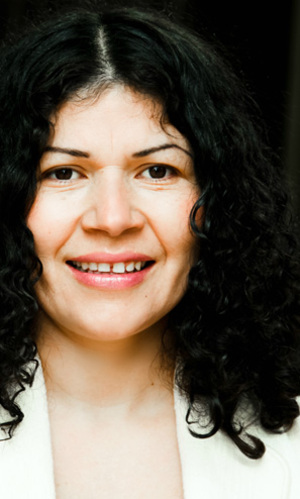I Promised Myself

Xochitl Rios
Oakes College ’13
Xochitl Rios’ father left school in fourth grade, coaxing a living out of the soil with crops of corn, beans, sugar cane and tomatoes. Her mother, who had a third-grade education, raised 12 children in the small village where they lived in Central Mexico.
Today, Rios, 37, is a UC Santa Cruz student majoring in chemistry with plans to go to graduate school. A U.S. citizen now, and a mom, she wants to work in pharmaceutical research some day.
“I am the first one in my family to go to a four-year college,” said Rios, sitting on a sun-speckled bench outside the Baskin School of Engineering. “I cannot go back.”
Rios came to the U.S. at 15 and enrolled in high school. But the death of her father forced her into full-time work to help support her family. She had jobs as a nanny, a day-care worker, and a clerk at a dry-cleaning shop. Because she was undocumented, Rios said, she had no hope for an education or a better job. She married and divorced. Then, two things happened which changed her life.
The first event was fortunate. She got a green card. The second was tragic. Her favorite sister, Lucy, was diagnosed with liver cancer and given six months to live.
“I didn’t have any money to help her,” said Rios, a woman with wavy hair and dark eyes. “I didn’t have any knowledge. We did not even have money for a funeral.” Tears spilled down her cheeks. “I promised myself I would go back to school and, if anyone else in my family had an emergency, I would be able to contribute with science, with knowledge, and with money.”
Armed with a green card and working fulltime as a nanny, Rios enrolled in Cañada College where she fell in love with chemistry. The science was a path to her dream of working to develop drugs to fight cancer.
She remembered how her own mother had made cough syrups and salves for rashes out of the plants where they lived. She remembered her Azteca ancestors. “It is in my blood,” Rios said of her chosen field.
When she applied for, and won, a Karl S. Pister Leadership Opportunity Award at UC Santa Cruz, she knew she was taking the next step toward a career in research.
“That scholarship meant everything to me,” she said. “It meant I didn’t have to work. It meant I survived.”
She said she “felt smaller than a piece of dust” as she helplessly watched her sister die.
She never wants to feel that way again.